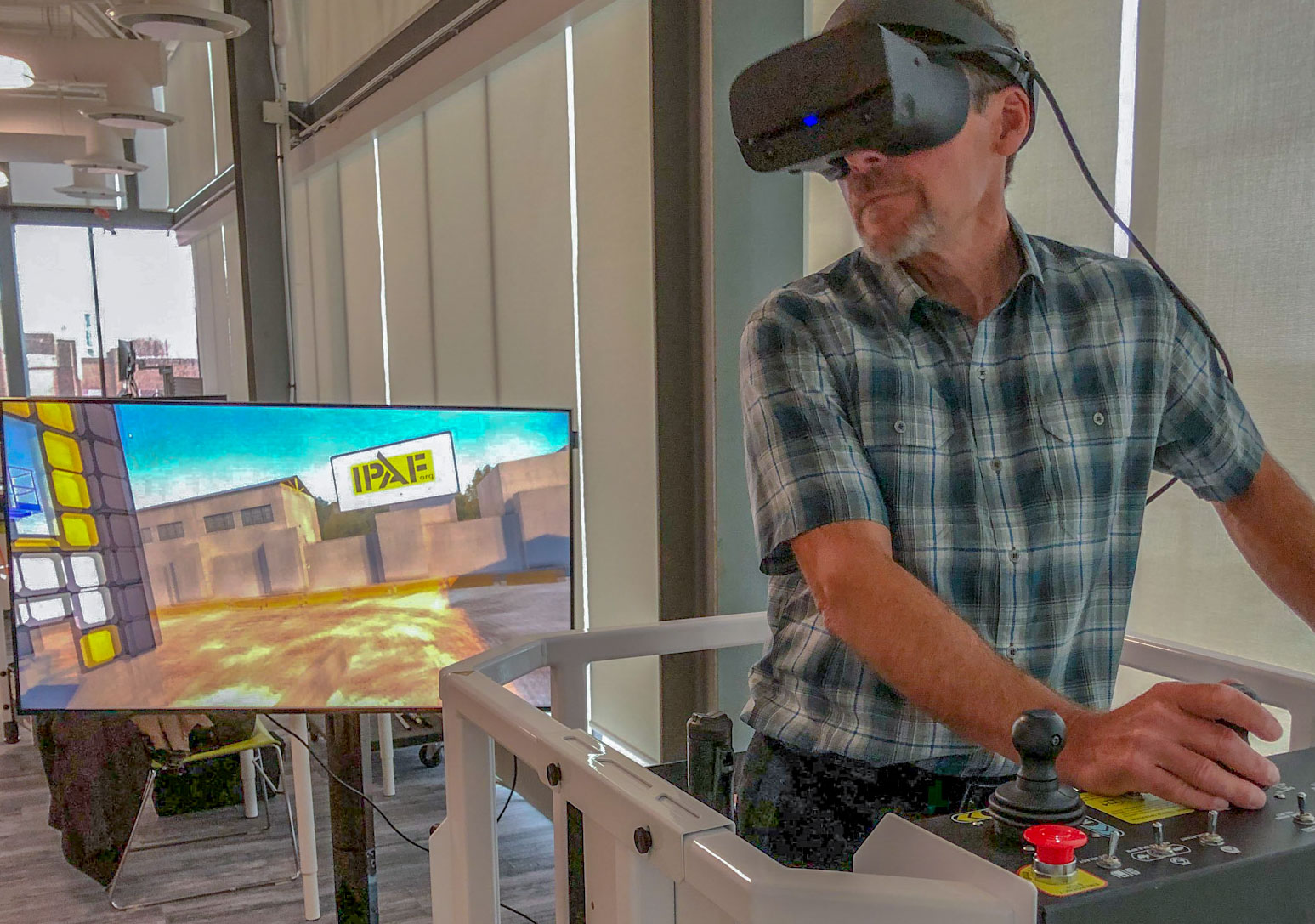Futurecast: Intelligent Data, Digitisation, Smart Depots, and Work Sites
Sponsored Article by Brian Parker

Adopting new technology, intelligent use of data, and embracing digitisation to deliver streamlined depots and worksites are likely to be the hallmarks of the near future of powered access, according to Brian Parker, Head of Safety and Technical at the International Powered Access Federation (IPAF).

Brian Parker
FOR IMMEDIATE RELEASE
22 February 2021, Ref. 22/02-UK-17
If tracking operators’ qualifications, machine time, and even vital signs on a smart-enabled worksite, using geo-fencing and telematics-tracked equipment fleets, running on clean, green power sources to conduct specialist tasks that have been rigorously trained for and rehearsed using virtual reality (VR) simulators sounds like the stuff of science fiction, then it’s time for a wake-up call… the future is already here and is inexorably transforming the way our industry works.
IPAF is at the leading edge of this change; during the past 18 months, and despite the challenges and upheavals of the ongoing pandemic, IPAF has delivered on key priorities such as overhauling its global incident reporting portal, producing an industry-focused MEWP safety report, updating more of its training into eLearning and VR environments, and adopting some of the key safety messages learned from intelligent analysis of accident data into new or updated courses including a completely revamped Load & Unload Course and a new Site Assessment for Correct MEWP Selection module, due for launch by the end of Q1 2021.
Perhaps the greatest leap forward, however, is the imminent launch of IPAF’s new ePAL app for operators and managers, which is predicted to be a “game-changer” for work-site safety and efficiency and marks a stride forward IPAF’s drive for greater sector sustainability.
IPAF’s ePAL will launch in April. It will be free to use and will feature a digital IPAF PAL Card, operator logbook, and operator safety guides. It will also allow operators to receive the latest IPAF safety information and good practice guidance and will ultimately allow construction managers to quickly and easily verify an operative’s qualifications, as well as for the operator to log and share their equipment time digitally and to report accidents or near-misses using the revamped IPAF reporting portal.
The ePAL app signals a step forward in IPAF’s ongoing drive to boost sustainability, as it shifts away from issuing plastic, credit-card-sized PAL Cards via the post to every training candidate successfully completing or renewing an IPAF operator course.
The app will also phase out paper certification of qualifications and logging of machine time and replace the printed paper version of IPAF’s operator safety guide, and overall will speed up the processing time and resource required to issue training candidates with their PAL Card and certification, which at present must be replaced each time a new machine category qualification is added or part of their training is renewed.
In 2020, IPAF passed the landmark of issuing 2 million PAL Cards globally; the digital version of the PAL Card will streamline the process and make it more environmentally sustainable, cutting the use of paper, ink, plastic, packaging, and international shipping.
This wholesale move from a plastic PAL Card to a digital one is a natural evolution. Developing an operator app has been a key priority for IPAF since Peter Douglas took up a post as CEO in 2019, IPAF has teamed up with IPAF member Trackunit to bring its considerable technical expertise to bear to roll the new app out.
IPAF’s ePAL will bring benefits for operators and IPAF training centres, while allowing us to streamline and digitise our processes, including issuing and renewing IPAF PAL Cards and helping operators keep track of their machine operating experience via the digital logbook function. The app will also offer an easy way for operators to access the latest relevant safety information and best practice technical guidance from IPAF.
IPAF seeks to be at the forefront in driving change and tries to ensure its members are fully consulted and are as involved as much as possible in shaping the future of these technological advancements.
This was certainly true when IPAF launched a widespread consultation on eXtended Reality (XR), leading to the publication of its XR Strategy, which became a springboard for ongoing efforts to bring IPAF training into the VR environment, first with IPAF PAL+ advanced operator training and with work ongoing to refresh existing operator qualifications.
VR simulators can also be used to deliver equipment familiarisation and supervised rehearsal of complex maneuvers or even high-risk procedures, working at the limits of what real-life machines can do safely, and exposing operators to at-risk scenarios in a way you would not wish to attempt using real machines.
Accident and the near-miss investigation is one area where there can never be too much data being tracked, but the real key is intelligent to use and analysis of that data and real-world application of the key findings.
IPAF uses this data to inform everything it does, for example updating its training into 360-learning environments, including recent major updates to MEWPs for Managers, MEWP Supervisor training in the US, and the revamped Load & Unload Course unveiled at the end of last year. The key findings also inform IPAF’s Andy Access and Toolbox Talks safety materials, and the federation’s global safety campaigns.
Of course, the industry as a whole is borne out of innovation, with increasingly sophisticated telematics and geo-fencing systems allowing rental companies and contractors to track fleet movements, control access, and even track both machine and operator health on the job. While not an option during the launch phase, IPAF is working with ePAL app development partner Trackunit to find ways to allow the new digital PAL Card to allow access to equipment for qualified personnel only.
IPAF is also working on a new detailed technical guidance document about the issue of secondary guarding – the various and multiple ways manufacturers are adopting new technology to prevent entrapment or crushing incidents in their machines. Because each manufacturer has a different technological solution, it is important for training and safety bodies in our industry to understand the different systems and ensure technical guidance remains up to date and relevant, and that basic principle of safety good practices are not forgotten about or that sophisticated warning and digital protection systems are neither overridden by the operator or treated as a guaranteed fail-safe.
Wearable technology will also have a part to play as operator safety and health is tracked and monitored throughout the working day – not least in the post-Covid era as operators and end contractors seek to ensure Covid-safety and bio-security on their work sites. Tracking temperature, heart rate, proximity to other operatives and monitoring access to geo-fenced work zones are already features of some advanced sites in action today. IPAF President Norty Turner will present on this very topic during the 2021 IPAF Summit, presented as a digital event for the first time ever on 18 March.
It’s fair to say that the new normal is here to stay on powered access worksites around the world; the fact that the past year has changed the way we all work, increased our sensitivity to personal responsibility and risk assessment in the workplace, and boosted the uptake of new digital technologies, can only be a good thing.
The future can sometimes seem like a daunting prospect, but in terms of technological innovation and intelligent use of data and digitisation, the future is already here and helping us work smarter and safer than ever before.

Norty Turner
Contact
Matt Brereton, Communications Manager
Tel: +44 (0)15395 66700 | |
About IPAF
IPAF is a not-for-profit members’ organisation that promotes the safe and effective use of powered access equipment worldwide. Members include manufacturers, rental companies, contractors, and users. Details at www.ipaf.org
